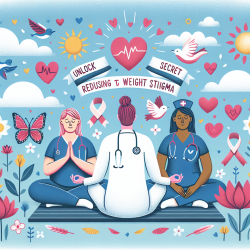Weight stigma is a pervasive issue in healthcare that affects both patients and providers. Recent research has highlighted the potential of self-compassion interventions, particularly Loving Kindness Meditation (LKM), in reducing this bias. This blog post delves into the findings of a study titled "Feasibility of a Loving Kindness Intervention for Mitigating Weight Stigma in Nursing Students: A Focus on Self-Compassion" and explores how practitioners can apply these insights to improve their practice.
The Power of Self-Compassion
Self-compassion involves being kind to oneself, recognizing shared human experiences, and maintaining mindfulness. The study found that higher levels of self-compassion are linked to lower levels of weight bias. This suggests that fostering self-compassion could be a valuable tool for healthcare providers to mitigate biases and enhance patient care.
Loving Kindness Meditation: A Promising Intervention
Loving Kindness Meditation (LKM) is a practice that encourages sending positive thoughts and compassion towards oneself and others. In the study, nursing students who engaged in LKM reported higher levels of positive emotions compared to those in a control group. While significant changes in weight bias were not observed immediately, the increase in positive emotionality is promising for long-term impact.
How Practitioners Can Implement LKM
- Regular Practice: Incorporate LKM into daily routines to build empathy and compassion over time.
- Psychoeducation: Educate staff about the origins of weight stigma and how LKM can help mitigate these biases.
- Workshops: Organize workshops that combine LKM with discussions on self-compassion and patient care.
The Role of Positive Emotions
The study also highlighted the role of positive emotions in reducing biases. Participants who practiced LKM experienced an increase in positive emotions, which are crucial for enhancing interpersonal relationships with patients. By cultivating positive emotionality, practitioners can improve their interactions with patients and provide more compassionate care.
Encouraging Further Research
The complexity of weight stigma requires ongoing research to identify effective interventions. Practitioners are encouraged to explore further studies on self-compassion interventions and consider integrating these practices into their professional development programs.










